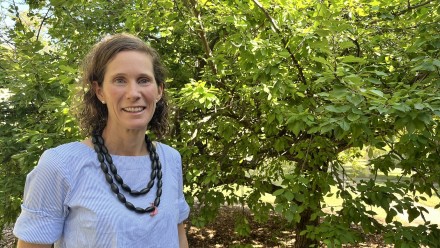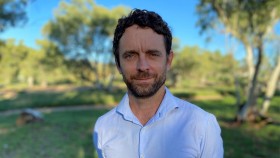Student Conversations: an International Women’s Day Special
Share
International Women’s Day is a chance for us to reflect, celebrate, value and continue to empower women and girls in our society to realise their full potential, according to PhD student Kate Pennington. In particular, the transformative power of education and its impact on shaping a brighter future for women and girls.
“Having an education enables women and girls to not only realise their full potential, but to be able to chart their own path. The empowerment derived from education not only elevates individual lives but contributes significantly to the broader fabric of an inclusive society” says Kate.
This International Women’s Day we chat with Kate Pennington about how she is furthering her education through a PhD at the National Centre for Epidemiology and Population Health. As a Sir Roland Wilson scholar from the Department of Health and Aged Care, Kate brings a wealth of experience having previously worked as an epidemiologist, contributing to public health responses and policies concerning communicable diseases.
What are you investigating for your PhD?
My research is examining previous pandemic influenza planning assumptions to the characteristics and public health responses for COVID-19. The rationale for this is that historically pandemic planning focussed on influenza viruses, however, the unique attributes of COVID-19 meant that responses had to be rapidly re-orientated. Additionally, I am also seeking to examine evidence requirements and decision-making structures to enhance public health decision making for future pandemics.
Why did you decide to undertake further study?
Leading a team of epidemiologists and data analysts as part of the pandemic response provided a continuous opportunity to reflect on the challenges that pandemics pose, especially their unpredictable and dynamic nature. This experience underscored the need to ensure that pandemic planning encompass both pathogen-agnostic and pathogen-specific considerations, and that decision-making is able to be supported by robust evidence sources.
My decision to pursue a PhD at NCEPH was driven by a desire to delve deeper into this topic. It also presented a unique opportunity to extend and refine my public health knowledge and expertise. Studying at NCEPH has also afforded me with broader development and knowledge enrichment opportunities.
You are a Sir Roland Wilson Scholar, can you tell us about that?
The Sir Roland Wilson Scholarship supports people from the Australian Public Service to pursue research on topics of national significance, as well as fostering the development of future thought leaders. By undertaking a PhD at ANU as a Sir Roland Wilson scholar, my research not only has the potential for impactful outcomes, but also furthers my professional skills and capabilities, as well as enhancing connections between academia and public policy.
What have you enjoyed most about your PhD so far?
Studying at NCEPH has been invaluable, providing access to academics in various domains and the opportunity to not only broaden my thinking but to also reset my foundational knowledge. I have thoroughly enjoyed the opportunity to study full-time. Having this time has not only enabled me to thoroughly explore my topic, but to also enhance connections between my professional experience with those experiences of the academics here.
What is the benefit of undertaking a PhD mid-career?
Embarking on a PhD mid-career has been an incredibly enriching experience. It has allowed me not only to delve deeper into a field that I am already very passionate about, but I have been able to leverage my professional background to ensure my research will be impactful. I would encourage anyone who is passionate about their field and wanting to advance their knowledge and inform impactful outcomes to consider undertaking a PhD.














